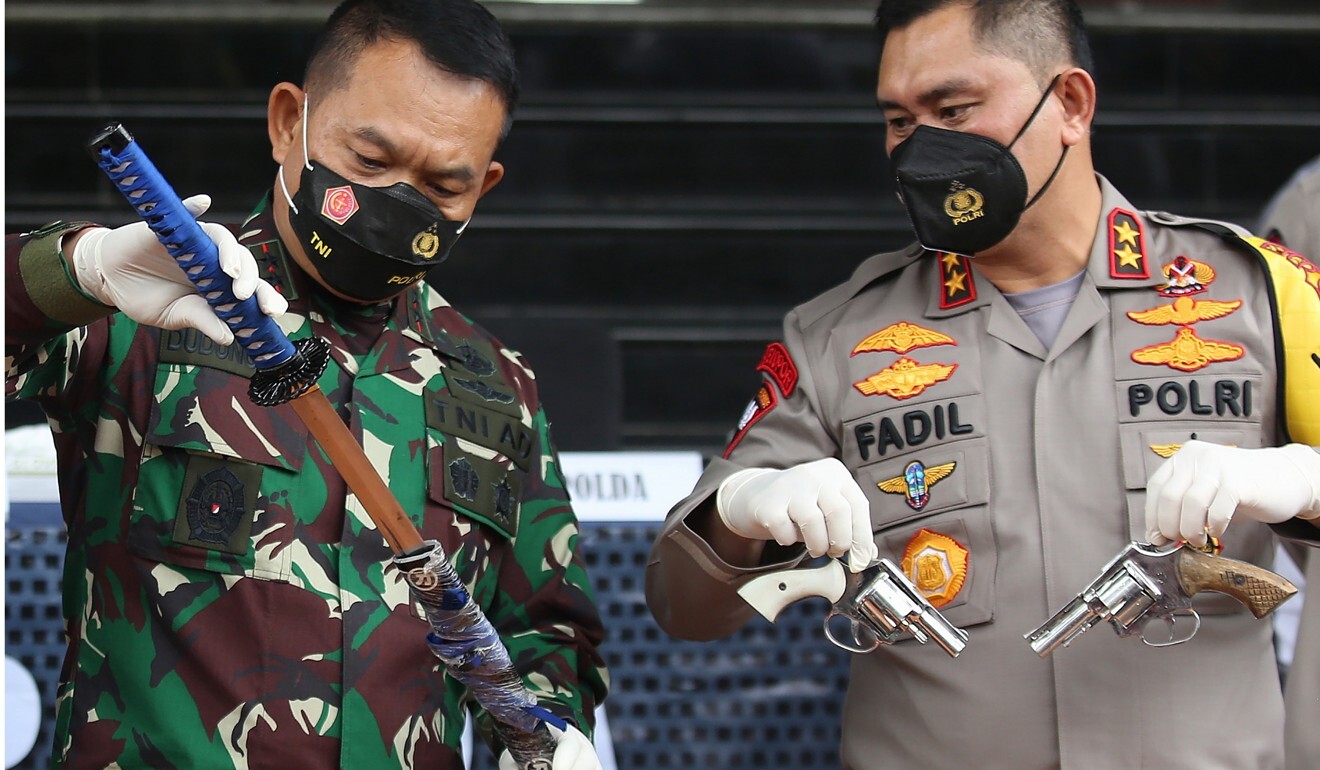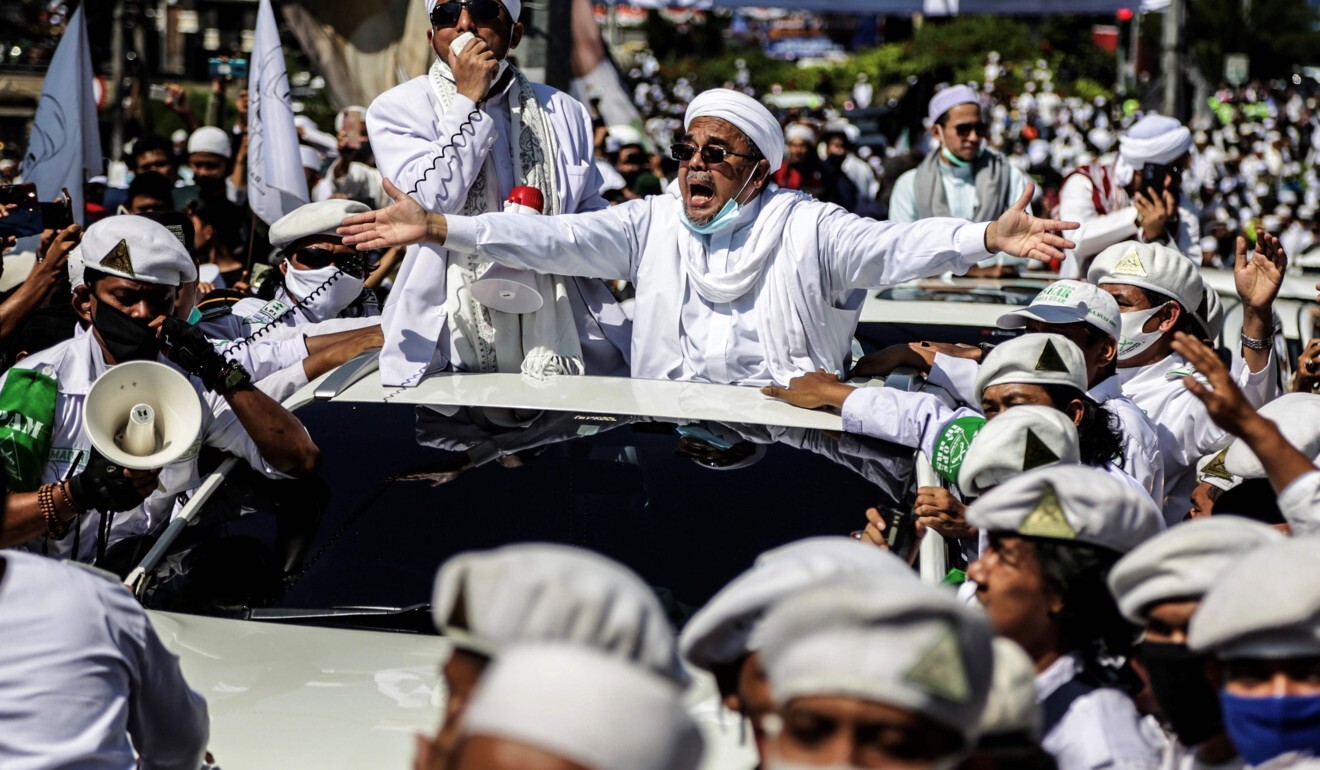
Police attack in Indonesia by firebrand cleric Habib Rizieq Shihab’s supporters sparks sectarian violence fears
- Six of the cleric’s Islamic Defender’s Front supporters were killed in a shoot-out with police. Pistols, a samurai sword and sickles were found at the scene
- Police had been investigating the hardline cleric for violating coronavirus health protocols upon his return last month from self exile in Saudi Arabia
The incident occurred on a highway just after midnight when a police car was attacked while following a vehicle believed to be carrying supporters of the cleric, resulting in a shoot-out.
“The police’s vehicle was boxed in … and stopped by two vehicles of the supporters [of Habib Rizieq], and attacked using firearms and sharp weapons in the form of a samurai sword and sickles,” said Jakarta police chief Fadil Imran.
“Feeling their lives were threatened, police took firm and measured actions against this group of 10 people, resulting in the death of six,” said Fadil. Another four ran away.
‘Call to jihad’ videos by Indonesia cleric’s fans show threat of rising fundamentalism
No officers were killed. The police vehicle was damaged as it was rammed by the attackers’ vehicle and also fired upon, resulting in bullet holes, said Fadil.
During a press conference on Monday, police displayed two pistols, a samurai sword and sickles seized from the scene of the clash.
Habib Rizieq, 55, was due to be questioned by police on Monday but did not show up, after also failing to appear last week.
Fadil called on Habib Rizieq to comply with the police summons and for his followers not to block the investigation.
Indonesia on alert after Isis-linked group beheads farmer to ‘sow terror’
The firebrand cleric heads the Islamic Defender’s Front (FPI), a hardline Islamic group. Since his return to Indonesia, he has called for the beheadings of those who insult the Prophet Mohammed, sought the release of a convicted terrorist leader and sanctioned prayers for President Joko Widodo’s death.
He left Indonesia in 2017 after facing charges of pornography and insulting state ideology. His supporters have denied the allegations, saying they are untrue.

The FPI claimed the six who were killed were “guards” for Habib Rizieq and were following the cleric and his family who were on the way to a dawn prayer event.
FPI lawyer Aziz Yanuar said “unknown thugs” blocked and fired at the guards. “Up until now, one car filled with six guards remains missing.”

Later on Monday, FPI secretary general Munarman denied that FPI followers had fired at the police. “There was no shoot-out. A shoot-out means both parties had firearms,” he was quoted as saying by CNN Indonesia.
Munarman said they “have no access to firearms” and it would be impossible that members would buy firearms on the black market.
He claimed that Habib Rizieq’s life is “currently in danger” but gave no details, adding that the cleric and his family are “in good health” after the incident.
What I am most worried about is the increasingly widespread sectarian outlook being embraced by an increasing number of people.
Indonesia Police Watch said in a statement on Monday that given the conflicting accounts, the incident should be investigated by an independent fact-finding team.
Human rights group Setara Institute said the shooting of six civilians is a concern, but if it is true that the weapons shown by Jakarta police belonged to FPI members, then the police actions could be accepted.
In this case, the FPI members who died would be “blind followers” who were turned into “martyrs by Habib Rizieq and FPI’s elites” to gain sympathy, the institute said. “However, the police must evaluate the use of firearms by its members.”

Former Indonesian environment minister Sarwono Kusumaadmatja, who served under two presidents, expressed concerns over the clash.
“Maybe we are headed towards an unavoidable conflict, with the sectarian versus the inclusive,” he said. “What I am most worried about is the increasingly widespread sectarian outlook being embraced by an increasing number of people.”
Sarwono said they “may not be coherently and openly organised and interconnected” but they can develop into clusters that can converge “into an open movement”.
Indonesian Muslim group calls for calm amid Islamic world’s fury at Macron
Recently, videos produced by Habib Rizieq’s fans in which a verse in the Muslim call to prayer was changed to a call for jihad went viral, raising fears it could trigger sectarian violence in the world’ most populous Muslim nation.
The FPI, which campaigns for the implementation of sharia law in secular Indonesia, has been implicated in multiple acts of harassment, intimidation, threats and mob violence against religious minorities. It is also known for attacking nightclubs and bars during the fasting month of Ramadan.
The front attacked and burned the homes of members of a tiny Muslim sect named Ahmadiyah. Some FPI members have also travelled to Syria to fight for Islamic State.
“The latest clash will feed into their narrative that the government is a tyrannical anti-Islam regime,” said Quinton Temby, a visiting fellow at the ISEAS-Yusof Ishak Institute in Singapore, adding the FPI has effectively used ‘martyr’ propaganda posters in past clashes with authorities.
Former al-Qaeda leader in Indonesia warns of attacks on French citizens
In the weeks since his return, Rizieq has declared plans to embark on a “moral crusade” and has met politicians and opposition figures, reflecting his growing influence was undiminished by his absence. The anti-Ahok rallies were the biggest since the fall of Indonesia’s former authoritarian ruler Suharto, in 1998.
Additional reporting by Reuters

